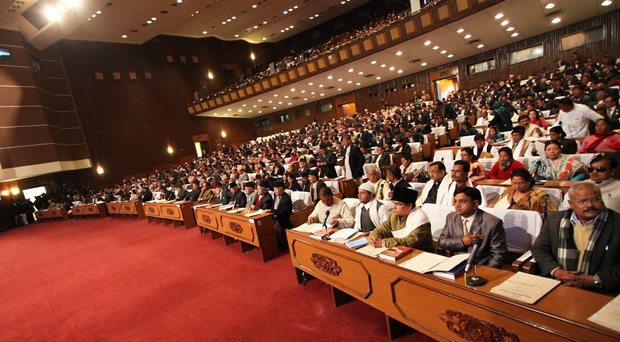Nepal adopts new constitution amid protests
With the promulgation of the new constitution, there will be fresh election to the top posts like president, vice president, prime minister, speaker and deputy speaker of parliament within a month.
In Article 4, the State of Nepal is described as an independent, indivisible, sovereign, secular, inclusive multicaste, republican state, oriented towards democratic socialism.
“I announce the presented constitution of Nepal, passed by the Constituent Assembly and authenticated by the chairman of the Constituent Assembly, effective from today, 20 September 2015, before the people of Nepal“, he said. The President added: “The Constitution is the common document of all of us to protect our freedom, independence, geographic integrity, and sovereignty”.
The violence has led to stoppage of freight trucks, with reportedly a 25-km-long line of trucks waiting at Ruxaul to cross over to Nepal.
There have been weeks of protests against the draft in southern Nepal, some of which have turned violent, with at least 40 people killed in clashes between protesters and security forces.
“The protesting parties see the current design of federal demarcation plan in the new constitution as a way to minimize their demographic power, and lessen their political bargaining capacity”, said Dipendra Jha, a lawyer at the Supreme Court and a Madhesi practicing in Kathmandu. We urge that issues on which there are differences should be resolved through dialogue in an atmosphere free from violence and intimidation, and institutionalized in a manner that would enable broad-based ownership and acceptance.
Giant neighbour India, which shares a border with Nepal, has watched the violence with concern. Geographically the Nepal is divided but between “Hills” in the north and flat lands (Tarai) with south. The hill-people are known as “Pahari” and people of south as “Madeshi”.
India feels the constitution has ignored the aspirations of the Madhesis and Tharus, people of Terai (Nepal’s long southern lowland strip bordering India).
Some among majority Hindus also believe the country’s reference as a Hindu nation should have been restored in the constitution.
Three major political parties – Nepali Congress, CPN-UML and UCPN-Maoist – organised a joint public meeting at Tundikhel Open Ground in Kathmandu on Monday to mark the historic occasion of promulgation of the Constitution.
India’s statements calling for wider consultations on the Constitution elicited strong reactions, and by noon on Tuesday, the hashtag had more than 50,000 tweets.












